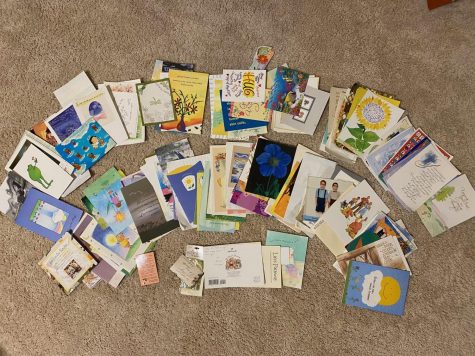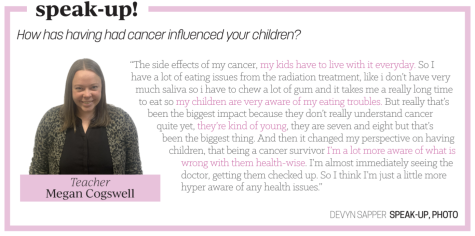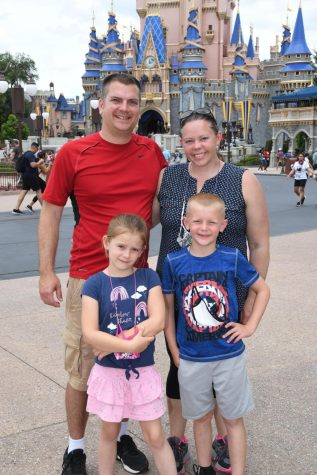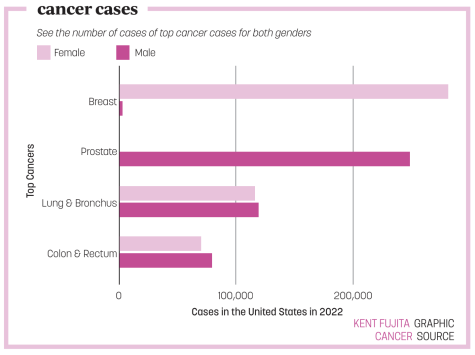When the world around her was heading out to college, math teacher Megan Cogswell, then 18 years old, was diagnosed with nasopharyngeal cancer.
Cogswell said, “I had just graduated high school. My whole senior year I felt like I had a really bad sinus infection, my neck was hurting, (and) my ears were hurting. We didn’t know what it was. We thought it was a sinus infection and then we thought maybe (it was) allergies.
“At the end of the summer before I was supposed to go to college, that’s when I was diagnosed with nasopharyngeal cancer. They found a tumor in my sinus cavity and it was Stage 4 and it had spread to my chest, my lymph nodes and my spine. It was bad. Instead of going to college, I started my treatment. I was diagnosed on a Thursday and started chemo on Monday.”

According to the National Cancer Institute, approximately 39.5% of men and women will be diagnosed with cancer at some point during their lifetime, but what makes Cogswell’s situation unique, in addition to the rarity of her type of cancer, is her age when she was diagnosed.
Kayla Epplin, clinical hospital coordinator at Cancer Support Community, said a common misconception of cancer is that it only impacts old people.
“I think one of the things I’ve seen when I’ve worked with teenagers (like Cogswell) or young adults that have had cancer is that role confusion or just that being an unexpected thing to have at such a young age. Typically, when we think of serious illness or cancer, you imagine being older in age when you experience those things,” Epplin said.
Since Cogswell was diagnosed at a young age, she said the doctors began aggressive treatment on her.
“I went through intense treatment—it nearly killed me. The radiation and chemo, they did it at the same time because I was young and healthy. They wanted to try to get it as fast as they could,” Cogswell said. “For me, I was like, ‘It’s a tumor. Go in and just take it out.’ I didn’t understand why they couldn’t just take it out, but my mom described it as jelly that just went everywhere and it had fingers that would just fill every crevice in there. The radiation is what really helped.”

While the radiation helped kill cancer cells in her body, Cogswell said she also experienced significant side effects.
She said, “I was throwing up stomach bile because I wasn’t eating anything with the radiation burns down my throat. I was probably throwing up at least five times a day. I lost 60 pounds. I had to get all new clothes because I lost everything. I was a swimmer and I lost everything.”
In fact, she said those side effects continue to impact her daily life now.
“I just saw my ENT (ear, nose, throat doctor) recently because I’ve been having some ear issues, ringing in my ears. just a lot of the side effects. I’m now 20 years out and the side effects from the radiation are starting to rear their ugly head a little bit more and we knew that (it would happen),” she said. “That was the price to survive.”
Despite all the challenges, Cogswell said she did not let the cancer deter her. Dying, she said, was never on her mind.
“I never once thought about dying. That never entered my mind. Looking back at it as an adult, I have a hard time fathoming that like, ‘How did I not think about dying the whole time?’” she said.
She said her perspective changed after she had children.
“Cancer never scared me before, but when I had kids, I became a lot more scared about getting it again,” she said. “I’ve started to get these visual migraines which are very common but for me, they’re like, ‘MRI immediately’ (because I’m considered cancer-prone) and so when stuff like that happens now, it’s a lot scarier than it ever was before I had kids.”
At the time, however, Cogswell said her main concern was not being able to go to college.

“I only cried one time,” she said. “It was the day after I came home from the hospital when I was diagnosed and I had to call and tell my best friend from high school. I think I cried more because I couldn’t go to college. I’m not kidding. I was just so devastated.”
Cogswell said she did go to college although it was a different college than she had originally planned to attend.
“I went to the University of Indianapolis because it was 20 minutes away from our house, so it was close, and my doctors wouldn’t let me go to Bradley University, which is where I was supposed to go,” Cogswell said.
For Epplin’s part, she said Cogswell’s experience is something she sees in many young cancer patients.
“To have cancer when you are younger, that can cause a lot of confusion, a lot of anger and a lot of uncertainty about what lies ahead in the future,” Epplin said. “Maybe (cancer) might impact fertility or starting a family (or) getting married. A lot of the things you are working towards (and the) dreams or hopes (you have) when you’re in young adulthood would have to be put on the back burner.”
Not only did cancer impact her, but Cogswell also said it greatly impacted her family. Cogswell said she is, in a way, glad she was the one who suffered it, so she wouldn’t have to see her family go through cancer treatment.
Cogswell said, “My mom is the one who did all the worrying for me. Dad went to one chemo treatment and was like, ‘I cannot handle this.’ I think Dad kind of took charge of my brother whereas Mom could focus more on me. My family really took the brunt of it.”
“Now looking back on it as a mom, I cannot imagine being in (my mom’s) shoes and (going through) what she had to endure and what she did,” she added. “(It) makes me cry a little bit. She kept a very close eye on me. I was really glad it was me that was sick. Watching a family member go through what I had to go through would have been 10 times worse.”

Cogswell said her cancer brought her family closer together.
“I talked to my brother every single day whereas before cancer, we were just brother and sister who fought every single day. My mom is my closest friend; I can’t even describe the bond,” she said. “(For) our church family, I was so appreciative of our church and how much they supported us through it. I probably got hundreds of cards and mail.”
To add on, Karen Bettner, bone marrow transplant social worker at Franciscan Health Indianapolis, said cards are an important way to connect with cancer patients who may feel isolated.
“My dad had cancer a long time ago when I was a kid. One thing I do remember is how isolated he felt because there was a point where nobody was checking in with him. It gets down to just a few friends sometimes,” Bettner said. “One of the things that my patients enjoy getting is cards. That’s kind of a lost art. They get text messages; they get emails, but they love getting cards. That’s something that people forget about in our modern world. We don’t do that as much.”
Ultimately, with World Cancer Day on Feb. 4, Cogswell said she encourages others to live life in the moment.
“I’m somebody who plans ahead. I had my whole life planned and cancer just said, ‘Nope!’ and that was a really hard lesson for me to learn,” she said. “We would go in for a chemo treatment that would maybe last two hours and they’d say, ‘Oh no, you need fluids and you need this,’ so we’d be there for eight hours. The whole day, you just never knew (what would happen).
“So now, I think you just got to do the best you can and just live day-by-day. You never know where your life’s going to take you and you just kind of have to go with whatever opportunities you’re given and try not to plan far ahead into the future.”
This is the third part for this story. Find the first and second parts here.


































![British royalty are American celebrities [opinion]](https://hilite.org/wp-content/uploads/2024/03/Screenshot-2024-03-24-1.44.57-PM.png)


















![Review: “Suits” is a perfect blend of legal drama and humor [MUSE]](https://hilite.org/wp-content/uploads/2024/04/unnamed-1.png)
![Chelsea Meng on her instagram-run bracelet shop [Biz Buzz]](https://hilite.org/wp-content/uploads/2024/04/IMG_2446-1200x838.jpg)
![Review: Quiet on Set: The Dark Side of Kids TV is the long awaited exposé of pedophilia within the children’s entertainment industry [MUSE]](https://hilite.org/wp-content/uploads/2024/04/unnamed.jpg)
![Review: “The Iron Claw” cannot get enough praise [MUSE]](https://hilite.org/wp-content/uploads/2024/04/unnamed.png)
![Review: “The Bear” sets an unbelievably high bar for future comedy shows [MUSE]](https://hilite.org/wp-content/uploads/2024/03/unnamed.png)
![Review in Print: Maripaz Villar brings a delightfully unique style to the world of WEBTOON [MUSE]](https://hilite.org/wp-content/uploads/2023/12/maripazcover-1200x960.jpg)
![Review: “The Sword of Kaigen” is a masterpiece [MUSE]](https://hilite.org/wp-content/uploads/2023/11/Screenshot-2023-11-26-201051.png)
![Review: Gateron Oil Kings, great linear switches, okay price [MUSE]](https://hilite.org/wp-content/uploads/2023/11/Screenshot-2023-11-26-200553.png)
![Review: “A Haunting in Venice” is a significant improvement from other Agatha Christie adaptations [MUSE]](https://hilite.org/wp-content/uploads/2023/11/e7ee2938a6d422669771bce6d8088521.jpg)
![Review: A Thanksgiving story from elementary school, still just as interesting [MUSE]](https://hilite.org/wp-content/uploads/2023/11/Screenshot-2023-11-26-195514-987x1200.png)
![Review: When I Fly Towards You, cute, uplifting youth drama [MUSE]](https://hilite.org/wp-content/uploads/2023/09/When-I-Fly-Towards-You-Chinese-drama.png)
![Postcards from Muse: Hawaii Travel Diary [MUSE]](https://hilite.org/wp-content/uploads/2023/09/My-project-1-1200x1200.jpg)
![Review: Ladybug & Cat Noir: The Movie, departure from original show [MUSE]](https://hilite.org/wp-content/uploads/2023/09/Ladybug__Cat_Noir_-_The_Movie_poster.jpg)
![Review in Print: Hidden Love is the cute, uplifting drama everyone needs [MUSE]](https://hilite.org/wp-content/uploads/2023/09/hiddenlovecover-e1693597208225-1030x1200.png)
![Review in Print: Heartstopper is the heartwarming queer romance we all need [MUSE]](https://hilite.org/wp-content/uploads/2023/08/museheartstoppercover-1200x654.png)






















![Review: Ladybug & Cat Noir: The Movie, departure from original show [MUSE]](https://hilite.org/wp-content/uploads/2023/09/Ladybug__Cat_Noir_-_The_Movie_poster-221x300.jpg)

![Review: Next in Fashion season two survives changes, becomes a valuable pop culture artifact [MUSE]](https://hilite.org/wp-content/uploads/2023/03/Screen-Shot-2023-03-09-at-11.05.05-AM-300x214.png)
![Review: Is The Stormlight Archive worth it? [MUSE]](https://hilite.org/wp-content/uploads/2023/10/unnamed-1-184x300.png)

